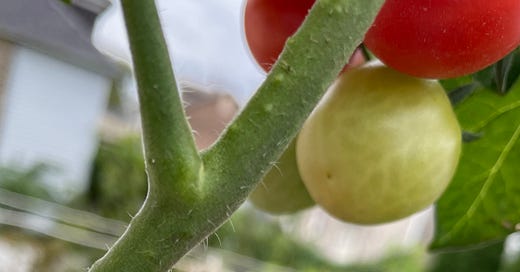It was the first full day of autumn, though the air still held much of the summer’s warmth. The yard glowed in copper light. Bright specks of red roses and ripe tomatoes dotted the green bushes and vines. About ten to 15 pounds of tomatoes still hung from the vines. I hadn’t planned on freezing any, and my father knew as much.
“Your comadre can take them,” he said, opening the storm door to enter the house.
We had been prepping his small SUV for his return to Mexico. He was leaving within the hour. During the summer, he had sold his big pickup and purchased an old, small SUV. It had needed some repairs, but overall, it was in good shape. The tires were good and should last for years. Everything fit. It was ready to go. The back seat was reserved for his dogs. We only had to load up a few more boxes and bags. My mother would have packed a few things for the house.
My brother, who had flown in from Mexico the day before, was packing up some bags with some items he had ordered online. They would follow a formula we had established about 15 years earlier: Leave in the evening. Drive all night. Arrive in Laredo the next afternoon, sleep there, and cross the border the next morning. The aim was to get to our house in Michocán the evening of that third day. The plan had mostly worked, though sometimes we would arrive well after nightfall. The good thing was that by that hour, we were close to home, our other home. We knew the terrain well.
My father returned to the door. “Oye,” he called. “Tell your comadre to bring some containers for the dog food.” He was in a hurry now.
I nodded, texted my comadre, and started plucking the tomatoes from the vine, setting most of them to the side. My comadre and compadre showed up a few minutes later. She helped me gather the few that remained. They had accompanied us during the previous year through the dark and difficult days when my mother fell ill and passed away. And although she was much younger than my mom, she considered my mother one of her best friends. We were family. They attended every day of the novenario after her funeral Mass and helped bring joy to our first Christmas without her. My father had chosen to spend it far from us, and he made the same choice that year.
“Thanks, compadre,” she said to me while biting into one. “They’ll be great to make salsa for taquitos dorados. Look at how juicy they are.” Juice dripped from her chin.
“De nada, comadre. De nada.”
She was trying to cheer me up.
My father had been looking to remake his life, a process that started long before my mother was diagnosed with cancer. Her death gave him a tidier route to fulfill that desire. He could now say he wanted and needed a new, younger wife. He was healthy, strong — stronger than any of his siblings. He wanted to enjoy what remained of his life, without us his children for the most part. He had been emotionally distant for years.
He came out of the house freshly showered, his hair still wet.
“Ready?” my compadre asked.
“Almost,” he said cheerfully entering the house with the containers for the dog food. He was out in a flash. He handed me the food. I put it in the cooler.
“Take care of yourself. Be careful out there,” my compadre said, hugging him tight.
“Gracias, gracias.”
My comadre hugged him too, “Dios lo bendiga.”
My father loaded the dogs. I said goodbye to my brother.
I turned, hugged my father and said, “Cuídate.”
“Adios. Take care of the house,” he said.
He didn’t mention Christmas.
He didn’t bless me with the sign of the cross.
My sister didn’t come or even call.
A brief hug and goodbye.
My brother pulled out of the garage, and my father got in. They drove down the alley, turned the corner, and out of sight. It was the last time I saw him alive.





